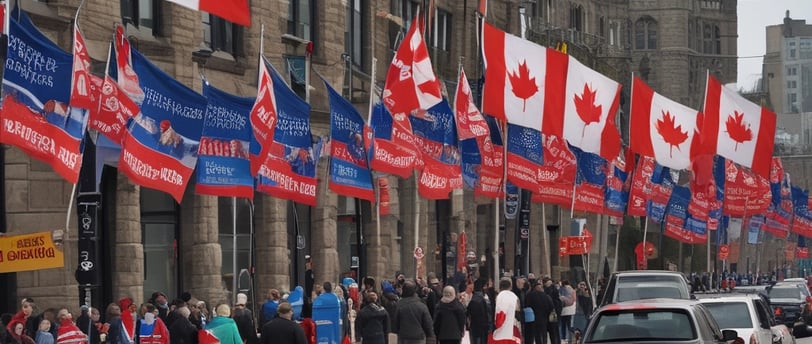Canada’s Political Future: Navigating a New Era After Justin Trudeau
"Justin Trudeau's resignation marks a significant turning point in Canadian politics. Explore the implications of his departure, the challenges and opportunities for the Liberal Party, and the key issues shaping the nation\u2019s future. Discover what\u2019s next for Canada as it prepares for a dynamic political transformation."
TRENDING IN CANADA
Yogi B
1/7/20253 min read


The Future of Canada’s Politics After Justin Trudeau’s Resignation
The political landscape of Canada is poised for significant transformation following the resignation of Prime Minister Justin Trudeau. As a prominent figure in Canadian politics for nearly a decade, Trudeau has left an indelible mark on the country’s domestic and international policies. However, his departure also raises crucial questions about the direction Canada’s politics will take in the coming years.
Trudeau’s Legacy
Justin Trudeau assumed office in 2015 as the leader of the Liberal Party, promising a progressive agenda centered on inclusivity, climate action, and social reform. His tenure saw milestones such as the legalization of cannabis, strides in LGBTQ+ rights, and international leadership on climate agreements. Despite these accomplishments, Trudeau’s tenure was not without challenges. Controversies, including the SNC-Lavalin affair and rising tensions with Indigenous communities, marred his leadership, sparking debates about the effectiveness and ethics of his governance.
Trudeau’s resignation marks the end of an era but leaves behind a mixed legacy that will undoubtedly shape the discourse for the next generation of Canadian leaders.
The Immediate Political Impact
The Liberal Party at a Crossroads: With Trudeau’s exit, the Liberal Party faces the challenge of finding a new leader who can maintain its unity and appeal. The choice of successor will be critical in defining the party’s ideological direction—whether it continues on a centrist-progressive path or shifts to address emerging conservative or populist sentiments.
Potential for Political Realignment: Trudeau’s resignation could lead to a reconfiguration of Canada’s political landscape. Other parties, such as the Conservative Party and the New Democratic Party (NDP), may seize this opportunity to attract voters disenchanted with the Liberal Party’s leadership.
Upcoming Elections: The timing of Trudeau’s resignation is significant as Canada prepares for the next federal elections. This transition period will be pivotal for political parties to redefine their platforms and strategies.
Key Issues Shaping Canada’s Political Future
Climate Change and Energy Policy: Canada’s approach to climate change and energy development will remain at the forefront of political debate. The balance between economic growth, particularly in energy sectors, and meeting international climate commitments will be a critical issue for Trudeau’s successors.
Indigenous Rights and Reconciliation: Trudeau’s tenure brought increased attention to Indigenous rights, but substantial progress remains to be achieved. The next leadership will need to address longstanding inequities and rebuild trust with Indigenous communities.
Healthcare and Social Policies: As the country grapples with post-pandemic challenges, healthcare reform and social welfare programs will dominate the political agenda. Rising costs and demand for equitable access will require innovative solutions.
Canada’s Role on the Global Stage: With geopolitical tensions rising worldwide, Canada’s foreign policy will play a crucial role in maintaining its influence. The next leader will need to navigate relationships with key partners, including the United States, China, and European nations.
Potential Leaders and Their Visions
Speculation abounds about who will succeed Trudeau as the face of the Liberal Party and potentially as Canada’s next prime minister. Contenders might include seasoned politicians with cabinet experience or fresh faces appealing to younger voters. Meanwhile, opposition leaders such as Pierre Poilievre of the Conservative Party and Jagmeet Singh of the NDP will aim to capitalize on the political vacuum left by Trudeau’s departure.
Public Sentiment and Political Engagement
Trudeau’s resignation also signals an opportunity for Canadians to reflect on the values they prioritize in their leadership. Public demand for accountability, transparency, and meaningful action on critical issues will likely shape the narrative of the next political era.
The resignation of Justin Trudeau marks a turning point in Canada’s political journey. While his departure creates uncertainty, it also offers an opportunity for renewal and reinvigoration of the country’s political vision. As new leaders emerge and parties redefine their identities, the choices Canadians make in the coming years will be pivotal in shaping the nation’s future. Whether the next chapter builds on Trudeau’s legacy or takes an entirely new direction remains to be seen, but one thing is certain: the future of Canadian politics will be both dynamic and transformative.
